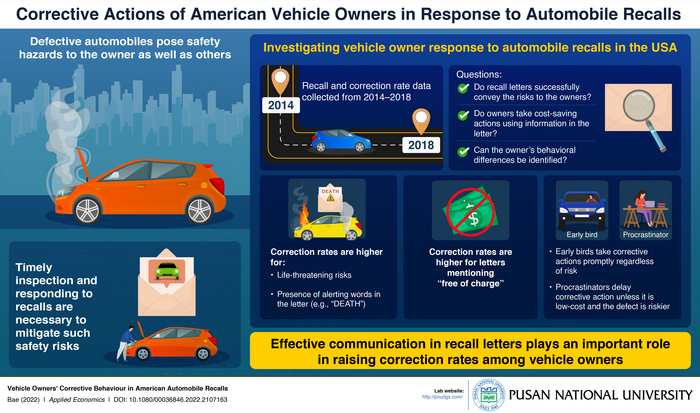Automobile recalls for manufacturing defects are essential to minimize potential risks and enhance public safety. In the event of a recall, the manufacturer issues a recall letter to the vehicle owner, which communicates the details of the risk involved and subsequent corrective actions. However, it is not clear whether recall letters result in prompt corrective actions. This motivated Prof. Yong-Kyun Bae from Pusan National University in Korea to investigate corrective behavior among American vehicle owners in response to automobile recalls. “Consumers always face potential risks from defective products. Without proper treatment and preventive tools via product recalls, they cannot be free from unreasonable risks and accidental harm,” notes Prof. Bae.

Credit: Yong-Kyun Bae from PNU, Korea
Automobile recalls for manufacturing defects are essential to minimize potential risks and enhance public safety. In the event of a recall, the manufacturer issues a recall letter to the vehicle owner, which communicates the details of the risk involved and subsequent corrective actions. However, it is not clear whether recall letters result in prompt corrective actions. This motivated Prof. Yong-Kyun Bae from Pusan National University in Korea to investigate corrective behavior among American vehicle owners in response to automobile recalls. “Consumers always face potential risks from defective products. Without proper treatment and preventive tools via product recalls, they cannot be free from unreasonable risks and accidental harm,” notes Prof. Bae.
In a recent study published online on 30 August 2022 in Applied Economics, Dr. Bae evaluated the key factors that determine the correction rate, given by the ratio of the number of automobiles inspected and remedied to the total number of vehicles involved in the recall, among American vehicle owners. To do this, recall data for automobiles in the US were collected for the period 2014 – 2018 and the following three questions were investigated: Do recall letters successfully convey the risk of defects to vehicle owners? Do vehicle owners opt for cost-saving actions based on the information in the letter? Do they exhibit any behavioral differences in their attitude toward corrective actions?
The analyses underscored the effectiveness of owner notification letters in two scenarios. First, when the recall letter included some alerting words indicating potentially life-threatening risks, such as death, the correction rate was higher. Second, more vehicle owners took prompt corrective measures when the letter emphasized that the corrective procedure was “free of charge.” “The results showed that vehicle owners responded to riskier defects more actively. Therefore, effective transmission of recall information from manufacturers to vehicle owners is necessary to remove defective vehicles and improve public safety,” says Prof. Bae.
In addition to highlighting the need for effective, standardized communication in recall letters, the study answered the question on behavioral differences among owners by classifying vehicle owners into two broad categories. On one hand were the “procrastinators,” who only take corrective actions in cases of high-risk defects and inexpensive corrective procedures. On the other hand were the “early birds,” who took prompt action upon intimation, regardless of the severity of the defect. To improve the correction rate, the study recommends that the National Highway Traffic Safety Administration (NHTSA) enforce corrective actions on procrastinators.
Overall, the findings of this study significantly adds to our understanding of human behavior in relation to concern for personal safety. This could greatly benefit manufacturers and regulators in ensuring effective communication with appropriate alert messages in recall letters. “With effective recall regulations, consumers can lead safer lives by consuming safer goods and services. Consequently, it would improve society’s overall welfare to benefit all its members,” concludes Prof. Bae.
***
Reference
DOI: https://doi.org/10.1080/00036846.2022.2107163
Authors: Yong-Kyun Bae*
Affiliations:
Department of Global Studies, Pusan National University
About Pusan National University
Pusan National University, located in Busan, South Korea, was founded in 1946 and is now the no. 1 national university of South Korea in research and educational competency. The multi-campus university also has other smaller campuses in Yangsan, Miryang, and Ami. The university prides itself on the principles of truth, freedom, and service, and has approximately 30,000 students, 1200 professors, and 750 faculty members. The university is composed of 14 colleges (schools) and one independent division, with 103 departments in all.
Website: https://www.pusan.ac.kr/eng/Main.do
About the author
Yong-Kyun Bae is a Professor and department chair in the department of Global Studies at Pusan National University, Korea, where he currently teaches courses in Economics. He received an M.A. in economics from Boston University and a Ph.D. in economics from Stony Brook University in the USA. Prof. Bae has authored several research papers in economics journals such as the Journal of Policy Analysis and Management, Economic Inquiry, and Applied Economics. He has also served as a referee in peer-reviewed economics journals, such as Applied Economics. His current research area involves vehicle recalls and public safety, social costs of risky products, product innovation, competition, industrial evolution, and economic analysis of tort liability law.
Lab website address: http://pnudgs.com
Journal
Applied Economics
DOI
10.1080/00036846.2022.2107163
Method of Research
Observational study
Subject of Research
People
Article Title
Vehicle Owners’ Corrective Behaviour in American Automobile Recalls
Article Publication Date
30-Aug-2022
COI Statement
No potential conflict of interest



